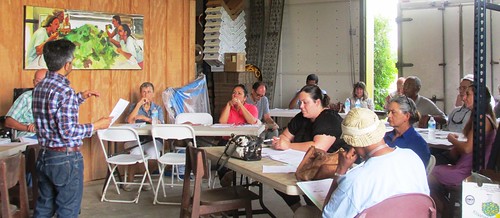
The Agricultural Marketing Service’s (AMS) National Organic Program (NOP) works every day to ensure that products with the USDA organic seal meet consistent, uniform standards. In addition to its rigorous certification process and oversight to protect the integrity of the organic seal, the program also connects organic farmers and businesses with resources to help them understand and comply with the standards.
In recent years, increasing numbers of Spanish speaking farmers and businesses have entered the organic sector. For example, among all operations located outside of the United States that are certified under the USDA organic regulations, 42 percent are in Spanish speaking countries in Latin America and the Caribbean. Meanwhile, within the United States, the number of Hispanic producers, many of whom speak Spanish as their primary language, increased 21 percent between 2007 and 2012.
To help our Spanish speaking stakeholders, AMS has already translated the USDA organic regulations and the Program Handbook to Spanish. The agency also conducted the first training for certifying agents in Spanish in Costa Rica in 2014, and has translated 17 training modules for certifying agents into Spanish.
Now, under the Sound and Sensible initiative, AMS has significantly expanded the resources available to Spanish speakers who seek information about organic certification. Under the initiative, which focuses on making organic certification more accessible, attainable, and affordable, AMS and its partners created an array of specialized tools and resources for producers, including templates, decision-making tools, trainings, guides, tip sheets, and videos. Among these are a number of resources in Spanish that help remove barriers to certification and simplify the certification process to ensure that organic is an option for more Spanish speaking farmers and businesses. Here are links to the new Spanish-language Sound and Sensible resources:
Video for Prospective Producers About Transitioning to Organic (California Certified Organic Farmers – CCOF): In the video, “Quisiera Certificarse Como Orgánico?” viewers can hear from organic producers about their certification experiences, and their perspectives on the value of organic certification to farmers.
Checklist: “Ten Steps to Transition” (California Certified Organic Farmers – CCOF): Written for prospective producers, this checklist outlines 10 steps for transitioning to organic certification. This easy-to-scan handout introduces new farmers to the certification process, including creating an organic system plan, understanding organic farm practices, and using only permitted fertilizers.
Tip Sheets: Organic Standards (National Center for Appropriate Technology (NCAT) – West): These resources summarize the rules and regulations, basic steps, key processes, and additional resources for newly certified operations. Topics include the organic approach to animal health; treatment of sick and injured livestock; organic pest management; soil resources; manure; compost; crop rotation; and transitioning orchards.
Organic Certification Videos (Washington State Department of Agriculture – WSDA): These videos are based on certified organic operations, allowing experienced organic farmers to help demystify the organic standards and the certification process. Each of the videos focuses on a topic: preventative practices for pest and disease management; recordkeeping; and the steps to organic certification.
